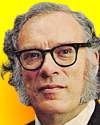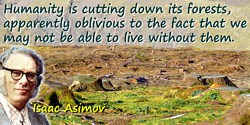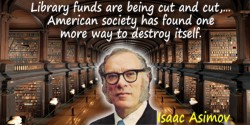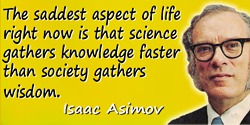 (source)
(source)
|
Isaac Asimov
(2 Jan 1920 - 6 Apr 1992)
Russian-American writer and biochemist who was a prolific author and editor of science fiction and non-fiction.
|
Isaac Asimov Quotes on Science (50 quotes)
>> Click for 265 Science Quotes by Isaac Asimov
>> Click for Isaac Asimov Quotes on | Belief | Biography | Creationist | Death | Fear | Ignorance | Knowledge | Life | Scientist | Solution | Theory | Understanding | Universe |
>> Click for 265 Science Quotes by Isaac Asimov
>> Click for Isaac Asimov Quotes on | Belief | Biography | Creationist | Death | Fear | Ignorance | Knowledge | Life | Scientist | Solution | Theory | Understanding | Universe |
“Any specialty, if important, is too important to be left to the specialists.” After all, the specialist cannot function unless he concentrates more or less entirely on his specialty and, in doing so, he will ignore the vast universe lying outside and miss important elements that ought to help guide his judgment. He therefore needs the help of the nonspecialist, who, while relying on the specialist for key information, can yet supply the necessary judgment based on everything else… Science, therefore, has become too important to be left to the scientists.
— Isaac Asimov
In 'The Fascination of Science', The Roving Mind (1983), 123. Asimov begins by extending a quote by George Clemenceau: “War is too important to be left to the generals.”
Clarke's First Law - Corollary: When, however, the lay public rallies round an idea that is denounced by distinguished but elderly scientists and supports that idea with great fervor and emotion—the distinguished but elderly scientists are then, after all, probably right.
— Isaac Asimov
'Asimov's Corollary', Fantasy & Science Fiction (Feb 1977). In collection Quasar, Quasar, Burning Bright (1978), 231.
A hypothesis may be simply defined as a guess. A scientific hypothesis is an intelligent guess.
— Isaac Asimov
In Isaac Asimov’s Book of Science and Nature Quotations (1988), 114.
A number of years ago, when I was a freshly-appointed instructor, I met, for the first time, a certain eminent historian of science. At the time I could only regard him with tolerant condescension.
I was sorry of the man who, it seemed to me, was forced to hover about the edges of science. He was compelled to shiver endlessly in the outskirts, getting only feeble warmth from the distant sun of science- in-progress; while I, just beginning my research, was bathed in the heady liquid heat up at the very center of the glow.
In a lifetime of being wrong at many a point, I was never more wrong. It was I, not he, who was wandering in the periphery. It was he, not I, who lived in the blaze.
I had fallen victim to the fallacy of the “growing edge;” the belief that only the very frontier of scientific advance counted; that everything that had been left behind by that advance was faded and dead.
But is that true? Because a tree in spring buds and comes greenly into leaf, are those leaves therefore the tree? If the newborn twigs and their leaves were all that existed, they would form a vague halo of green suspended in mid-air, but surely that is not the tree. The leaves, by themselves, are no more than trivial fluttering decoration. It is the trunk and limbs that give the tree its grandeur and the leaves themselves their meaning.
There is not a discovery in science, however revolutionary, however sparkling with insight, that does not arise out of what went before. “If I have seen further than other men,” said Isaac Newton, “it is because I have stood on the shoulders of giants.”
I was sorry of the man who, it seemed to me, was forced to hover about the edges of science. He was compelled to shiver endlessly in the outskirts, getting only feeble warmth from the distant sun of science- in-progress; while I, just beginning my research, was bathed in the heady liquid heat up at the very center of the glow.
In a lifetime of being wrong at many a point, I was never more wrong. It was I, not he, who was wandering in the periphery. It was he, not I, who lived in the blaze.
I had fallen victim to the fallacy of the “growing edge;” the belief that only the very frontier of scientific advance counted; that everything that had been left behind by that advance was faded and dead.
But is that true? Because a tree in spring buds and comes greenly into leaf, are those leaves therefore the tree? If the newborn twigs and their leaves were all that existed, they would form a vague halo of green suspended in mid-air, but surely that is not the tree. The leaves, by themselves, are no more than trivial fluttering decoration. It is the trunk and limbs that give the tree its grandeur and the leaves themselves their meaning.
There is not a discovery in science, however revolutionary, however sparkling with insight, that does not arise out of what went before. “If I have seen further than other men,” said Isaac Newton, “it is because I have stood on the shoulders of giants.”
— Isaac Asimov
Adding A Dimension: Seventeen Essays on the History of Science (1964), Introduction.
A scientist is as weak and human as any man, but the pursuit of science may ennoble him even against his will.
— Isaac Asimov
Unverified. Contact webmaster if you know a primary source.
Anyone who writes about science must know about science, which cuts down competition considerably.
— Isaac Asimov
Epigraph in Isaac Asimov’s Book of Science and Nature Quotations (1988), 262.
During the 1930s, Nazi oppression drove numerous scientists to Great Britain and the United States, and they were a key factor in the development of the nuclear bomb—a development widely touted in the United States as based on “Yankee know-how.” Except that virtually all the Yankees had foreign accents.
— Isaac Asimov
In 'Combatting U.S. Scientific Illiteracy', Los Angeles Times (31 Mar 1989).
During the century after Newton, it was still possible for a man of unusual attainments to master all fields of scientific knowledge. But by 1800, this had become entirely impracticable.
— Isaac Asimov
The Intelligent Man's Guide to Science (1960), 19.
Every hour a scientist spends trying to raise funds is an hour lost from important thought and research.
— Isaac Asimov
Epigraph in Isaac Asimov’s Book of Science and Nature Quotations (1988), 287.
How often people speak of art and science as though they were two entirely different things, with no interconnection. An artist is emotional, they think, and uses only his intuition; he sees all at once and has no need of reason. A scientist is cold, they think, and uses only his reason; he argues carefully step by step, and needs no imagination. That is all wrong. The true artist is quite rational as well as imaginative and knows what he is doing; if he does not, his art suffers. The true scientist is quite imaginative as well as rational, and sometimes leaps to solutions where reason can follow only slowly; if he does not, his science suffers.
— Isaac Asimov
'Prometheus.' The Roving Mind (1983), Chap 25.
I believe that only scientists can understand the universe. It is not so much that I have confidence in scientists being right, but that I have so much in nonscientists being wrong.
— Isaac Asimov
Webmaster has not yet been able to confirm this attribution. If you know an original print citation, please contact Webmaster.
I’m sure that science can’t ever explain everything and I can give you the reasons for that decision … I believe that scientific knowledge has fractal properties; that no matter how much we learn, whatever is left, however small it may seem, is just as infinitely complex as the whole was to start with. That, I think is the secret of the universe.
— Isaac Asimov
In It’s Been a Good Life (2009), 258, cited as from I. Asimov: A Memoir (1994), 481.
In 1900 however, he [Planck] worked out the revolutionary quantum theory, a towering achievement which extended and improved the basic concepts of physics. It was so revolutionary, in fact, that almost no physicist, including Planck himself could bring himself to accept it. (Planck later said that the only way a revolutionary theory could be accepted was to wait until all the old scientists had died.)
— Isaac Asimov
(1976). In Isaac Asimov’s Book of Science and Nature Quotations (1988), 324.
Increasingly, our leaders must deal with dangers that threaten the entire world, where an understanding of those dangers and the possible solutions depend on a good grasp of science. The ozone layer, the greenhouse effect, acid rain, questions of diet and of heredity--all require scientific literacy. Can Americans choose the proper leaders and support the proper programs if they are scientifically illiterate?
— Isaac Asimov
articles.latimes.com/1989-03-31/news/vw-543_1_scientific-literacy
Increasingly, our leaders must deal with dangers that threaten the entire world, where an understanding of those dangers and the possible solutions depends on a good grasp of science. The ozone layer, the greenhouse effect, acid rain, questions of diet and heredity. All require scientific literacy. Can Americans choose the proper leaders and support the proper programs if they themselves are scientifically illiterate? The whole premise of democracy is that it is safe to leave important questions to the court of public opinion—but is it safe to leave them to the court of public ignorance?
— Isaac Asimov
In Los Angeles Times (31 Mar 1989).
Individual science fiction stories may seem as trivial as ever to the blinder critics and philosophers of today–but the core of science fiction, its essence, the concept around which it revolves, has become crucial to our salvation if we are to be saved a
— Isaac Asimov
…...
Inspect every piece of pseudoscience and you will find a security blanket, a thumb to suck, a skirt to hold. What does the scientist have to offer in exchange? Uncertainty! Insecurity!
— Isaac Asimov
Past, Present, and Future (1987), 65.
It is a great deal easier to believe in the existence of parapsychological phenomena, if one is ignorant of, or indifferent to, the nature of scientific evidence.
— Isaac Asimov
Epigraph in Isaac Asimov’s Book of Science and Nature Quotations (1988), 207.
It is change, continuing change, inevitable change, that is the dominant factor in society today. No sensible decision can be made any longer without taking into account not only the world as it is, but the world as it will be … This, in turn, means that our statesmen, our businessmen, our everyman must take on a science fictional way of thinking.
— Isaac Asimov
In 'My Own View', Robert Holdstock (ed.), The Encyclopedia of Science Fiction (1978). As cited in Robert Andrews, The Columbia Dictionary of Quotations (1993), 129.
It is hard to describe the exact route to scientific achievement, but a good scientist doesn’t get lost as he travels it.
— Isaac Asimov
Epigraph in Isaac Asimov’s Book of Science and Nature Quotations (1988), 290.
It is quite possible that mathematics was invented in the ancient Middle East to keep track of tax receipts and grain stores. How odd that out of this should come a subtle scientific language that can effectively describe and predict the most arcane aspects of the Universe.
— Isaac Asimov
Epigraph in Isaac Asimov’s Book of Science and Nature Quotations (1988), 265.
Physics is the basic science. One can easily argue that all other sciences are specialized aspects of physics.
— Isaac Asimov
Epigraph in Isaac Asimov’s Book of Science and Nature Quotations (1988), 210.
Pierre Curie, a brilliant scientist, happened to marry a still more brilliant one—Marie, the famous Madame Curie—and is the only great scientist in history who is consistently identified as the husband of someone else.
— Isaac Asimov
View from a Height (1963), 119.
Psychology marks the triumph of human evolution. How many other species would need a science of the mind?
— Isaac Asimov
Epigraph in Isaac Asimov’s Book of Science and Nature Quotations (1988), 223.
Religion cannot object to science on moral grounds. The history of religious intolerance forbids it.
— Isaac Asimov
Epigraph in Isaac Asimov’s Book of Science and Nature Quotations (1988), 273.
Religion considers the Universe deterministic and science considers it probabilistic—an important distinction.
— Isaac Asimov
Epigraph in Isaac Asimov’s Book of Science and Nature Quotations (1988), 221.
Science can amuse and fascinate us all, but it is engineering that changes the world.
— Isaac Asimov
Isaac Asimov’s Book of Science and Nature Quotations (1988), 78.
Science can be introduced to children well or poorly. If poorly, children can be turned away from science; they can develop a lifelong antipathy; they will be in a far worse condition than if they had never been introduced to science at all.
— Isaac Asimov
[Unverified. Please contact Webmaster if you can identify the primary source.]
Science doesn’t purvey absolute truth. Science is a mechanism, a way of trying to improve your knowledge of nature. It’s a system for testing your thoughts against the universe, and seeing whether they match.
— Isaac Asimov
'Isaac Asimov Speaks' with Bill Moyers in The Humanist (Jan/Feb 1989), 49. Reprinted in Carl Howard Freedman (ed.), Conversations with Isaac Asimov (2005), 143-144. Bill Moyers asked “What’s real knowledge?” Asimov replied, “Well, we can’t be absolutely certain.” He continued answering as in the quote above.
Science fiction writers foresee the inevitable, and although problems and catastrophes may be inevitable, solutions are not.
— Isaac Asimov
'How Easy to See the Future'. In Asimov on Science Fiction (1981), 86.
Science in the service of humanity is technology, but lack of wisdom may make the service harmful.
— Isaac Asimov
Epigraph in Isaac Asimov’s Book of Science and Nature Quotations (1988), 321.
Science is complex and chilling. The mathematical language of science is understood by very few. The vistas it presents are scary—an enormous universe ruled by chance and impersonal rules, empty and uncaring, ungraspable and vertiginous. How comfortable to turn instead to a small world, only a few thousand years old, and under God's personal; and immediate care; a world in which you are His peculiar concern.
— Isaac Asimov
The 'Threat' of Creationism. In Ashley Montagu (ed.), Science and Creationism (1984), 192.
Science is dangerous. There is no question but that poison gas, genetic engineering, and nuclear weapons and power stations are terrifying. It may be that civilization is falling apart and the world we know is coming to an end. In that case, why no turn to religion and look forward to the Day of Judgment, ... [being] lifted into eternal bliss ... [and] watching the scoffers and disbelievers writhe forever in torment.
— Isaac Asimov
The 'Threat' of Creationism. In Ashley Montagu (ed.), Science and Creationism (1984), 192.
Science is uncertain. Theories are subject to revision; observations are open to a variety of interpretations, and scientists quarrel amongst themselves. This is disillusioning for those untrained in the scientific method, who thus turn to the rigid certainty of the Bible instead. There is something comfortable about a view that allows for no deviation and that spares you the painful necessity of having to think.
— Isaac Asimov
The 'Threat' of Creationism. In Ashley Montagu (ed.), Science and Creationism (1984), 192.
Science must be taught well, if a student is to understand the coming decades he must live through.
— Isaac Asimov
Epigraph in Isaac Asimov’s Book of Science and Nature Quotations (1988), 255.
Scientific apparatus offers a window to knowledge, but as they grow more elaborate, scientists spend ever more time washing the windows.
— Isaac Asimov
[Unverified. Please contact Webmaster if you can identify the primary source.]
The card-player begins by arranging his hand for maximum sense. Scientists do the same with the facts they gather.
— Isaac Asimov
Epigraph in Isaac Asimov’s Book of Science and Nature Quotations (1988), 318.
The dangers that face the world can, every one of them, be traced back to science. The salvations that may save the world will, every one of them, be traced back to science.
— Isaac Asimov
In Today and Tomorrow (1974), 304.
The most exciting phrase to hear in science, the one that heralds new discoveries, is not 'Eureka!' (I found it!) but 'That's funny....'
— Isaac Asimov
In Ashton Applewhite, William R. Evans and Andrew Frothingham, And I Quote (2003), 467
The nations may be divided in everything else, but they all share a single body of science.
— Isaac Asimov
Epigraph in Isaac Asimov’s Book of Science and Nature Quotations (1988), 270.
The rockets that have made spaceflight possible are an advance that, more than any other technological victory of the twentieth century, was grounded in science fiction… . One thing that no science fiction writer visualized, however, as far as I know, was that the landings on the Moon would be watched by people on Earth by way of television.
— Isaac Asimov
In Asimov on Physics (1976), 35. Also in Isaac Asimov’s Book of Science and Nature Quotations (1988), 307.
The saddest aspect of life right now is that science gathers knowledge faster than society gathers wisdom.
— Isaac Asimov
IIsaac Asimov's Book of Science and Nature Quotations (1988), 281.
The wish to believe, even against evidence, fuels all the pseudosciences from astrology to creationism.
— Isaac Asimov
There is a single light of science, and to brighten it anywhere is to brighten it everywhere.
— Isaac Asimov
In Erin Gruwell and Frank McCourt, The Gigantic Book of Teachers' Wisdom (2007), 578.
There is an art to science, and science in art; the two are not enemies, but different aspects of the whole.
— Isaac Asimov
Epigraph in Isaac Asimov’s Book of Science and Nature Quotations (1988), 251.
There is no duress like one’s own conscience and it is that which makes life so needlessly bitter.
— Isaac Asimov
Aphorism as given by the fictional character Dezhnev Senior, in Fantastic Voyage II: Destination Brain (1987), 252.
Though science can cause problems, it is not by ignorance that we will solve them.
— Isaac Asimov
…...
Unfortunately, in many cases, people who write science fiction violate the laws of nature, not because they want to make a point, but because they don't know what the laws of nature are.
— Isaac Asimov
In Carl Howard Freedman (ed.), Conversations with Isaac Asimov (2005), back cover.
What can be more important than the science of life to any intelligent being who has the good fortune to be alive?
— Isaac Asimov
Epigraph in Isaac Asimov’s Book of Science and Nature Quotations (1988), 36.
Whatever else astronomy may or may not be who can doubt it to be the most beautiful of the sciences?
— Isaac Asimov
Epigraph in Isaac Asimov’s Book of Science and Nature Quotations (1988), 26.
See also:
- 2 Jan - short biography, births, deaths and events on date of Asimov's birth.
- Isaac Asimov - context of quote “It’s the bees and the flowers.” - Medium image (500 x 250 px)
- Isaac Asimov - context of quote “It’s the bees and the flowers.” - Large image (800 x 400 px)
- Asimov's Chronology of Science and Discovery, by Isaac Asimov. - book suggestion.
- Booklist for Isaac Asimov.



 In science it often happens that scientists say, 'You know that's a really good argument; my position is mistaken,' and then they would actually change their minds and you never hear that old view from them again. They really do it. It doesn't happen as often as it should, because scientists are human and change is sometimes painful. But it happens every day. I cannot recall the last time something like that happened in politics or religion.
(1987) --
In science it often happens that scientists say, 'You know that's a really good argument; my position is mistaken,' and then they would actually change their minds and you never hear that old view from them again. They really do it. It doesn't happen as often as it should, because scientists are human and change is sometimes painful. But it happens every day. I cannot recall the last time something like that happened in politics or religion.
(1987) -- 


